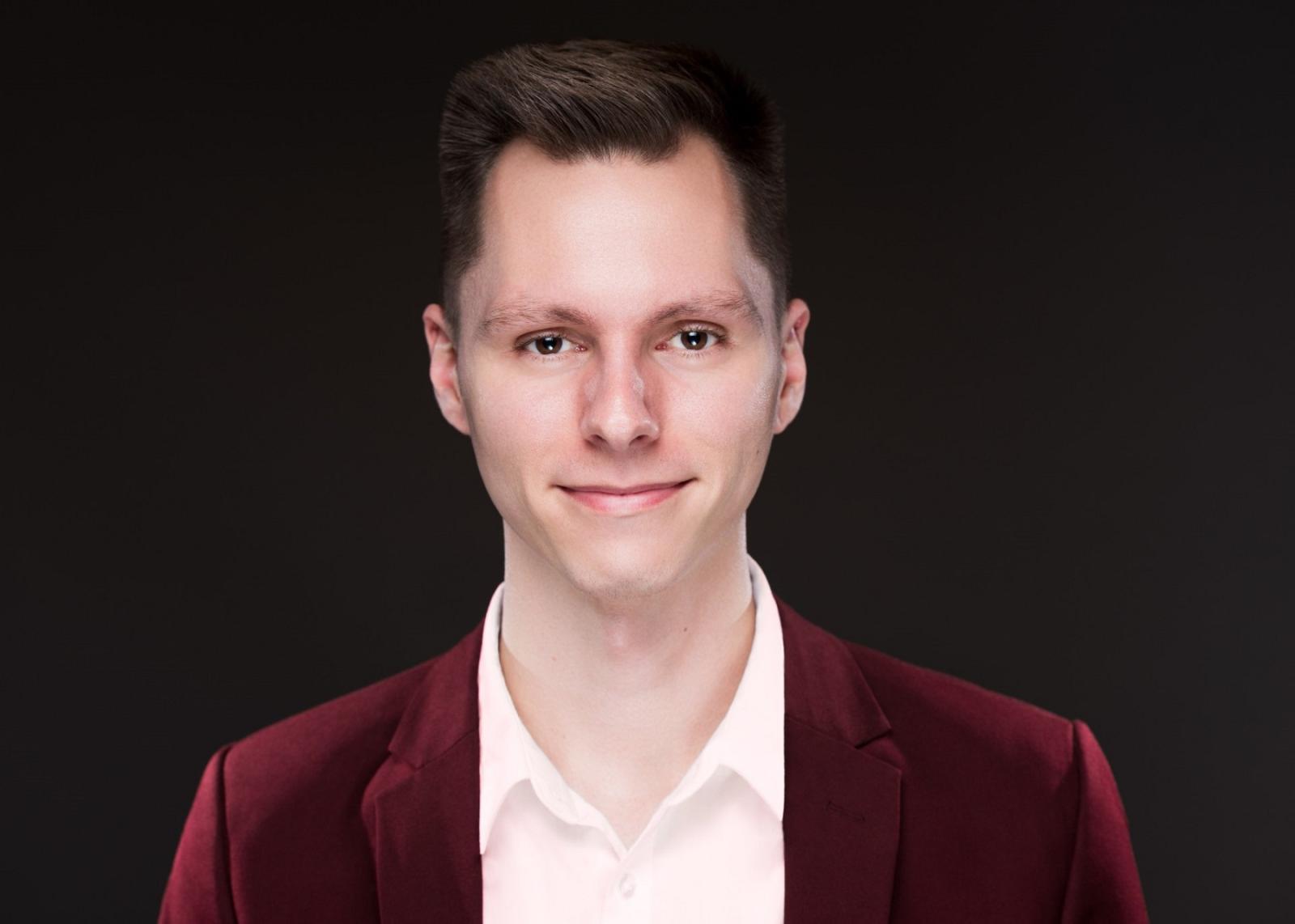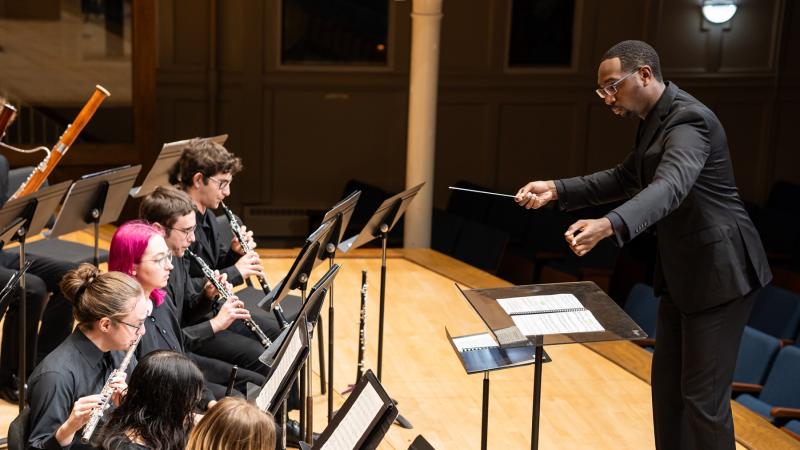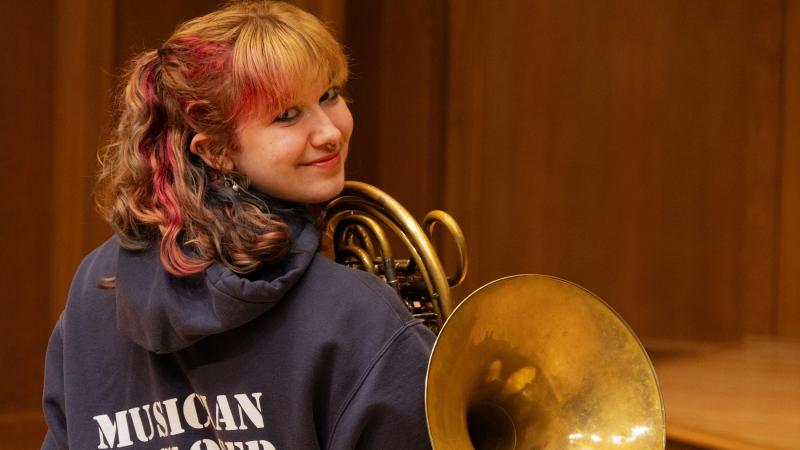Nicolas Bizub ’16 has written a new composition that will be premiered this week as part of the celebration of the Lawrence University Conservatory of Music’s 150th anniversary.
The work is entitled Musica est lux (“Music is light”), a spin on Lawrence’s own Latin motto, “Veritas est lux” (“Truth is light”). Such imagery rings especially true for Bizub, who describes his music as “dark, striving, and yearning, which also points toward radiance and light.”
“I really wanted to push the piece toward light and I wanted to have it go through some kind of struggle,” he said. “So, the music on the whole is starting somewhat subdued and getting very bright toward the end.”
The piece was co-commissioned by Lawrence and the Wisconsin Music Teachers Association (WMTA). It will be performed by a faculty ensemble at 7:30 p.m. Oct. 25 in Harper Hall, part of the WMTA Conference, hosted by Lawrence. It is one of numerous performances during the 2024-25 academic year that celebrate 150 years of the Conservatory of Music and the Lawrence Community Music School.
“For me, music allowed me to really be my full, authentic self,” Bizub said.
This sentiment is central to his new composition and his love for Lawrence. Bizub graduated from Lawrence in 2016 with a Bachelor of Music degree while majoring in both composition/music theory and viola performance. He also achieved a certificate in Lawrence’s then-new program in innovation and entrepreneurship.
Michael Mizrahi, Lawrence’s Frank C. Shattuck Professor of Music, reached out to him about the composition as part of the 150th celebration.
While the Conservatory gave him creative freedom, Bizub said he had distinct, personal goals from the start: he wanted to encapsulate the university’s transformative impact on its students, alongside his own artistic aspirations.
“When I went to Lawrence, I was not out as a gay man, but now I am—I came out at Lawrence,” Bizub said. “So, there's a selfish element of finding one's voice and true identity in the piece, but I try to keep it universal, to also just celebrate the amazing teaching that happens at Lawrence.”
To achieve this, Bizub employs a distinct harmonic palette.
“In general, my music is tonally centric, and I do play a lot with familiar harmonies like major and minor, but I often, in terms of getting into the dark part of harmony, I infect them,” he said.
Essentially, Bizub takes standard harmonies and adds carefully selected dissonances to create an appealing paradox: simultaneously familiar and new.
Bizub has also turned to the peculiarities of individual instruments, expressing lightness or darkness through the timbre of extended techniques. Musica est lux is written for a “Pierrot ensemble,” which includes flute, clarinet, violin, cello, piano, and voice. Although the traditional format often includes percussion, Bizub opted for an alto saxophone instead.
“I’ve become quite fond of these small chamber ensembles,” he said.
Integrate intellectual and musical virtuosity in a supportive, creative community that will empower you to find your musical path.
Small instrumental ensembles have captured Bizub’s imagination for some time. His doctoral recital at the University of Cincinnati featured Earth Requiem (2021), his dissertation composition written for a “Messiaen quartet,” including four unique instruments alongside pre-recorded electronics and four solo voices.
In many ways, Earth Requiem foreshadows Musica est lux. Both give special attention to the augmented triad, which itself is a slightly altered major triad. The result follows suit with Bizub’s signature ambiguity.
This nuanced approach to composition is something he developed over time, beginning at Lawrence.
“I was trained as a composer, a performer, a theorist, and a music historian,” Bizub said.
This holistic education, he said, was essential to him succeeding in his current job as director of growth marketing for the New York Philharmonic.
“I think you start to really uncover at Lawrence ... this full picture of the musical field, and I find that extremely important in everything that I do,” Bizub said. “I work in marketing for the New York Philharmonic; I wouldn't be able to do that job without having gone through all of the musical training that I did, because I think, fundamentally, Lawrence really teaches you how to think for yourself and develop your own voice.”
Bizub credits individual instruction at Lawrence for developing his identity. Several professors were particularly impactful, including Associate Professor of Music Joanne Metcalf, who taught him what music can do for people, and his viola professor, Associate Professor of Music Matthew C. Michelic, who introduced him to understanding the physicality of performing.
As for current students, Bizub encourages an open mind and fearless exploration.
“Keep your interests wide and don't be afraid to try out new things,” he said. “So many of the things I write about in music come from experiential things that are sometimes wholly disconnected from the arts.”



